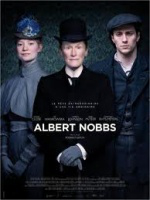Film: Albert Nobbs

A genteel film about gentility. Based on a novella by George Moore, Albert Nobbs is a project cherished by Glenn Close after she acted the character on stage in the 1980s. She worked on the screenplay and produced the film and offers a tour-de-force performance as Albert, a 19th century woman who dressed and acted as a man, who was comfortable acting as a servant at a hotel in Dublin (meticulous like Anthony Hopkins' character, Stevens, in Remains of the Day). Yet, Albert had an ambition to buy and manage a tobacco shop. Having said that Glenn Close's performance is a tour-de-force, it should be said that she is quite self-effacing as Albert.
Pauline Collins plays Mrs Baker, the owner of the hotel, a bumptious woman, fawning on her high-class guests while being severe on her staff. Amongst the staff are Brenda Fricker as Polly, in charge of the kitchen, and Helen (Mia Wasikowska), a pert young woman who hopes for better things. Into this world comes an illiterate handyman, Joe (Aaron Johnson) who takes to Helen and she to him - though, as he will state later, ruefully, that his life and his relationship with Helen is a cliché. There is a great deal of attention given to the details of life and work at the hotel, especially some of the work of the elderly male servants.
But, while Albert is short, small, rather repressed, rather unaware of the gender and sexual implications of the decision to live as a man, the other standout character and performance is that of Janet McTeer as Mr Hubert Page, a painter. Her performance is striking and strong and a persuasively dramatic counterpoint to Albert as they both deal with the decisions they have made. There is an excellent scene where the two put on women's clothing (very awkwardly) and take a walk along the beach (also very awkwardly) which leads to a fall by Albert. It is quite moving.
The dramatic turn comes when Albert says that it would be good for him to have a wife. He gives his attention to Helen and invites her to walk out with him - again very genteel, especially in sitting at a fashionable restaurant, promenading, and going to look at a building which Albert would like to buy for the tobacconist's.
The film builds up, quietly, to an unexpected climax and ending, but there is a genteel poetic justice in the way that the film and its themes conclude.


















